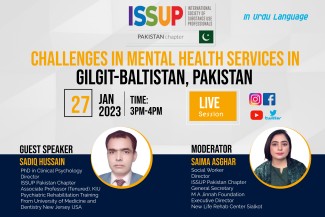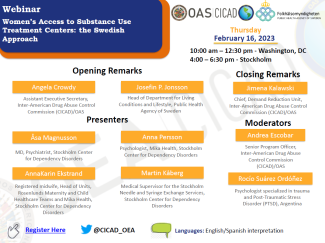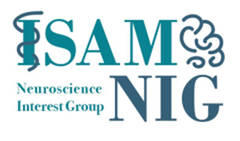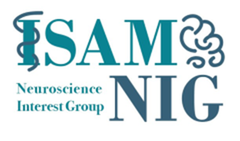Applying interventions designed to reduce and manage the symptoms of substance use disorders.
Treatment
Profiles of quality of outpatient care use, associated sociodemographic and clinical characteristics, and adverse outcomes among patients with substance-related disorders
Role of psychologist in rehabilitation centre
📣 ISSUP Pakistan Chapter is going to conduct Live Session on "ROLE OF PSYCHOLOGIST IN REHABILITATION CENTER" from ISSUP Pakistan Chapter's & Youth Forum Pakistan's Facebook Pages, YouTube Channels,Twitter, Instagram and LinkedInn with Guest Speaker Mr.

Provider self-efficacy in delivering evidence-based psychosocial interventions: A scoping review
Challenges in Mental Health Services in Gilgit Baltistan, Pakistan
ISSUP Pakistan Chapter is going to conduct live session on "CHALLENGES IN MENTAL HEALTH SERVICES IN GILGIT BALTISTAN, PAKISTAN"

Women’s Access to Substance Use Treatment Centers: the Swedish Approach
You are invited to attend this webinar that CICAD is co-organizing with Sweden this coming February 16th, 2023. Live English/Spanish interpretation is provided.
Click here to register.

Current Scientific Evidence About Mutual Help Groups
Description
This presentation summarizes the current evidence about the effectiveness of mutual help groups and the mechanisms of action in these groups, including AA, SMART, LifeRing, and WFS. AA is comparably effective to well-implemented CBT. The evidence so far suggests that the other groups are comparably effective to AA. Further studies are in progress.
ISAM at Lisbon Addictions 2022
ISAM neuroscience interest group webinar series

ISAM Neuroscience Interest Group in collaboration with ENIGMA Addiction Working Group

Evidence-Based Resource Guide Series: Expanding Access to and Use of Behavioural Health Services for People Experiencing Homelessness
Please join the MHTTC Network, SAMHSA and Abt Associates for an upcoming webinar highlighting findings from SAMHSA's new guide, Expanding Access to and Use of Behavioural Health Services for People Experiencing Homelessness. Wait times for placement into permanent housing can range from a few months to several years, and longer periods of homelessness are associated with lower rates of recovery and higher rates of psychiatric distress.